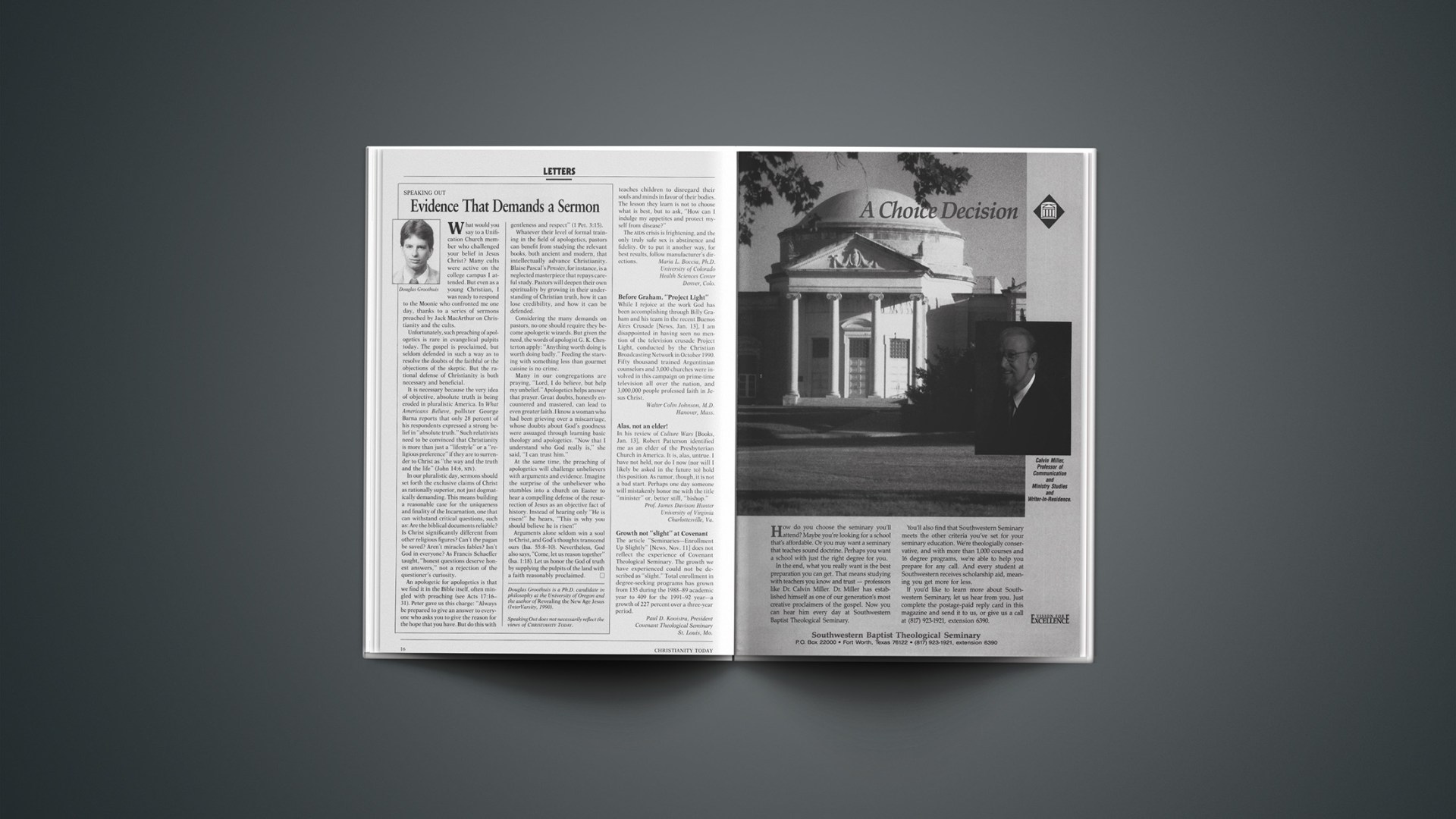What would you say to a Unification Church member who challenged your belief in Jesus Christ? Many cults were active on the college campus I attended. But even as a young Christian, I was ready to respond to the Moonie who confronted me one day, thanks to a series of sermons preached by Jack MacArthur on Christianity and the cults.
Unfortunately, such preaching of apologetics is rare in evangelical pulpits today. The gospel is proclaimed, but seldom defended in such a way as to resolve the doubts of the faithful or the objections of the skeptic. But the rational defense of Christianity is both necessary and beneficial.
It is necessary because the very idea of objective, absolute truth is being eroded in pluralistic America. In What Americans Believe, pollster George Barna reports that only 28 percent of his respondents expressed a strong belief in “absolute truth.” Such relativists need to be convinced that Christianity is more than just a “lifestyle” or a “religious preference” if they are to surrender to Christ as “the way and the truth and the life” (John 14:6, NIV).
In our pluralistic day, sermons should set forth the exclusive claims of Christ as rationally superior, not just dogmatically demanding. This means building a reasonable case for the uniqueness and finality of the Incarnation, one that can withstand critical questions, such as: Are the biblical documents reliable? Is Christ significantly different from other religious figures? Can’t the pagan be saved? Aren’t miracles fables? Isn’t God in everyone? As Francis Schaeffer taught, “honest questions deserve honest answers,” not a rejection of the questioner’s curiosity.
An apologetic for apologetics is that we find it in the Bible itself, often mingled with preaching (see Acts 17:16–31). Peter gave us this charge: “Always be prepared to give an answer to everyone who asks you to give the reason for the hope that you have. But do this with gentleness and respect” (1 Pet. 3:15).
Whatever their level of formal training in the field of apologetics, pastors can benefit from studying the relevant books, both ancient and modern, that intellectually advance Christianity. Blaise Pascal’s Pensées, for instance, is a neglected masterpiece that repays careful study. Pastors will deepen their own spirituality by growing in their understanding of Christian truth, how it can lose credibility, and how it can be defended.
Considering the many demands on pastors, no one should require they become apologetic wizards. But given the need, the words of apologist G. K. Chesterton apply: “Anything worth doing is worth doing badly.” Feeding the starving with something less than gourmet cuisine is no crime.
Many in our congregations are praying, “Lord, I do believe, but help my unbelief.” Apologetics helps answer that prayer. Great doubts, honestly encountered and mastered, can lead to even greater faith. I know a woman who had been grieving over a miscarriage, whose doubts about God’s goodness were assuaged through learning basic theology and apologetics. “Now that I understand who God really is,” she said, “I can trust him.”
At the same time, the preaching of apologetics will challenge unbelievers with arguments and evidence. Imagine the surprise of the unbeliever who stumbles into a church on Easter to hear a compelling defense of the resurrection of Jesus as an objective fact of history. Instead of hearing only “He is risen!” he hears, “This is why you should believe he is risen!”
Arguments alone seldom win a soul to Christ, and God’s thoughts transcend ours (Isa. 55:8–10). Nevertheless, God also says, “Come, let us reason together” (Isa. 1:18). Let us honor the God of truth by supplying the pulpits of the land with a faith reasonably proclaimed.
Douglas Groothuis is a Ph.D. candidate in philosophy at the University of Oregon and the author of Revealing the New Age Jesus (InterVarsity, 1990).
Speaking Out does not necessarily reflect the views of CHRISTIANITY TODAY.









